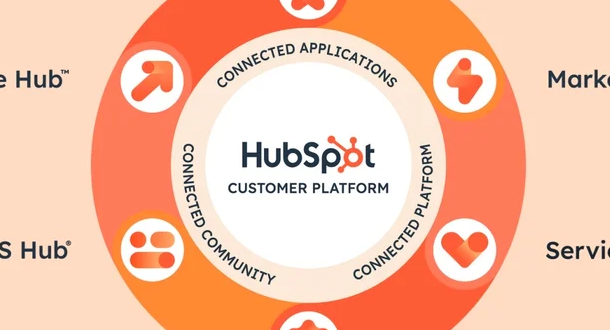HubSpot vs Salesforce: which CRM system is better?
Although CRM software has now become normal (or even almost mandatory) in the business world, choosing which software to use for your business is not an easy one. As software becomes more and more complex and powerful, that decision - which depends on necessary features, scalability and budget - becomes increasingly difficult. This article looks at the comparison between two of the most popular CRMs - HubSpot and Salesforce - and gives you insight into which system your business needs.
The past 30 years have seen many advances in customer relationship management (CRM) software. As the name implies, CRM software aims to manage your relationship with your customers. However, such a simple statement does not do justice to the value that a CRM can offer your business. The power of CRMs lies in the way they automate relationship management and support your conversion cycles by aligning your marketing and sales teams around centralized customer data.
'What is CRM ' is no longer the question these days. CRM software is now normal (or even almost mandatory) in the business world but choosing which software to use is not an easy one. As the software becomes more and more complex and powerful, that decision - which depends on necessary features, scalability and budget - becomes increasingly difficult. This article looks at the comparison between two of the most popular CRMs - HubSpot and Salesforce - and gives you insight into which system your business needs.
Table of Contents
Choosing the right CRM: HubSpot versus Salesforce
teams together so your business can grow sustainably. Both promise centralized data management and have dedicated applications or hubs for specific marketing, sales or service tasks. Also, both platforms claim to make it easy to automate tedious tasks like reporting, save your teams time tracking leads and ensure more reliable conversion of prospects into customers ... Great promises. But the real question is whether HubSpot and Salesforce can live up to these expectations. Because despite the similarities, HubSpot and Salesforce really are different. We're going to look at what these differences might mean for you.
Since HubSpot and Salesforce are top CRM platforms, that means they are not all that different from each other in terms of power and functionality. HubSpot is an award-winning platform for SMB+ to large enterprises and offers contact management, sales analytics, sales automation and, of course, managing your sales pipeline, among other things. Salesforce can do the same thing though Salesforce's entire product portfolio is much more expansive and therefore more complex. This is partly due to the many acquisitions Salesforce has made. More than 40! Sometimes this is an advantage, sometimes a disadvantage. If we want to differentiate one CRM from another, we have to look not only at functionality, but also at ease of use, scalability and price.
Ease of use
The ease of use of your CRM platform is essential. After all, there is little point in investing in a platform to support your marketing, sales and service teams if it is too complicated to use.
In this area, HubSpot is the winner. HubSpot's powerful tools are designed for the ordinary user: you master them fairly quickly, work intuitively, and you don't necessarily need a functional administrator. That's because HubSpot designed everything with the end user in mind. Whether that's the marketer or sales person. In addition, HubSpot supports its software through a great knowledge base and free HubSpot academy with 1000-odd tutorials, best practices and certification tracks. Adopting these in most cases leads to an improvement in your commercial clout, and when combined with HubSpot's reporting and automation services offers better commercial insight into your organization.
Salesforce has a steeper learning curve and you need an experienced functional administrator (IT person) to manage the platform. While this platform is also incredibly powerful (especially the customizable reporting that is incredibly useful for larger organizations), its implementation can be tricky and its complexity in components requires ongoing maintenance to manage the system.

Scalable support
If you invest in a CRM platform, it is essential that you have accessible support with it, unless you employ a lot of experienced staff to solve any problems. Hiring outside consultants is not only costly, but it also doesn't give you direct access to the platform's creators, so the knowledge is always second-hand. What you need is support that's available 24/7, scalable for the growth of your business and won't cost you a rib.
HubSpot has always been big on customer support. The company offers (free) phone and email support for all Pro and Enterprise customers. And what's even better: this support remains free. In fact, there are no additional costs when your business reaches a certain size. This means you can scale up without worrying about support.
Salesforce offers 24/7 premium support, but for that you pay 20% of your net contract price. That means that as you grow, the cost of support will also increase. They do go deeper with Salesforce in answering your questions than HubSpot, but whether that's a merit is the question.
Holistic solutions
A CRM platform is very useful for centralizing your customer data, which can save a lot of administrative hassle in terms of customer conversations and sales conversions. But if your CRM is not integrated with the other tools and platforms used in the rest of your organization, it only adds to the clutter. After all, you don't want your staff to have to log into 5 different platforms every day to get to work.

Over the years, HubSpot has (thankfully) significantly outgrown its roots as a unique marketing automation platform. With the Sales Hub, Service Hub, CMS Hub and the HubSpot CRM at its core, and oh, an integration or two.... or 500, HubSpot is now a complete ecosystem - where you can track the entire customer journey. So you bring your entire organization under one data roof.
Salesforce, on the other hand, has developed its own CRM shell for the complex landscape that has now become Salesforce, called: Salesforce Customer 360. I may be a bit cynical and sarcastic in my tone, and biased to say the least ;-) I often visit companies that are expertly sewn into the Salesforce suit. And that suit, according to the customer, is quite comfortable. So who am I. Perhaps in 2009 Salesforce was indeed a very good solution for many. But as Salesforce got bigger and bigger (acquiring over 60 companies for over $30 billion.....), helping customers may no longer be the primary goal at Salesforce if you ask me. There are some other interests.
Prices
What we look at when looking at new software is price. And we often base our decision on that. But that's where it goes wrong. At first glance, HubSpot and Salesforce's prices are close to the prices quoted on e.g. a website. But if you scrutinize the additional costs, you get a better idea of the actual costs. And that's not even including Salesforce consulting prices.
|
HubSpot |
Salesforce |
|
|
Recommended price |
€ 1,200/month for 10 paid users |
€ 1,500/month for 10 users |
|
User licenses |
€ 120/month/extra paid user |
€ 25 - € 150/extra user, depending on package |
|
Implementation |
Flat rate of € 3,000 for Enterprise Onboarding. Additional technical consulting services available at additional cost |
Salesforce offers a "Jump-Start" implementation for €5,000 |
|
Customer Support |
Phone and email support included for all Professional and Enterprise editions |
|
|
Outbound calling |
Included with all editions (2000 minutes per user/month for Enterprise), but not available in all countries |
€ 45/user/month (for 1000 minutes) |
|
Sales engagement |
Included with Enterprise:
|
Inbox €25/user/month More add-ons |
|
TOTAL (annually for a team of 10) |
€ 17.400 |
€ 43.680 |
(Source)
HubSpot clearly comes out on top in terms of pricing, ease of use and the ability for scalable support (without paying blue in software and consulting). Salesforce offers a number of features for enterprise users that may be necessary for this kind of big boy. HubSpot's fast, reliable and powerful integration with Salesforce means, however, that you have the benefits of both platforms at the same time. But ultimately, choosing a CRM platform should depend on the immediate needs of your business and your vision for growth.

Want to get the most out of HubSpot? Subscribe to our newsletter, follow us on LinkedIn, or attend our HubSpot User Days!
Explore HubSpot User DaysShare this
You May Also Like
These Related Stories
The story of HubSpot
What is HubSpot? Read all about HubSpot here


